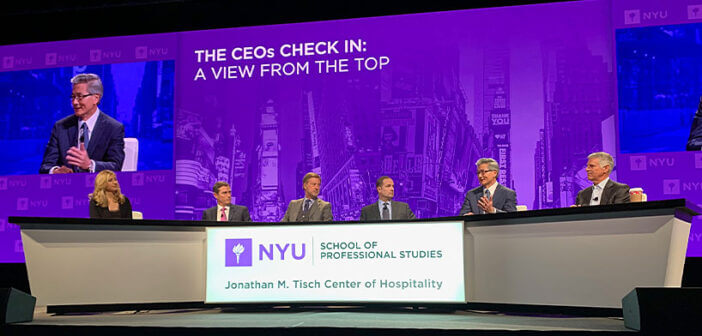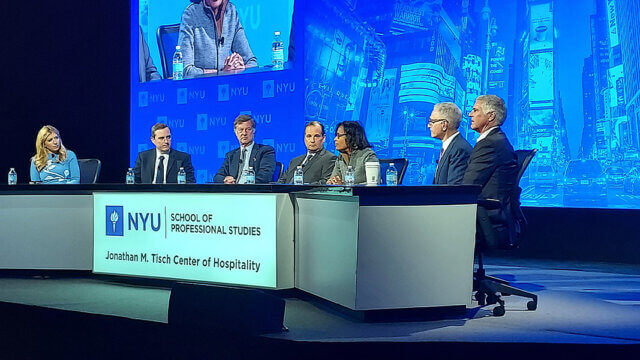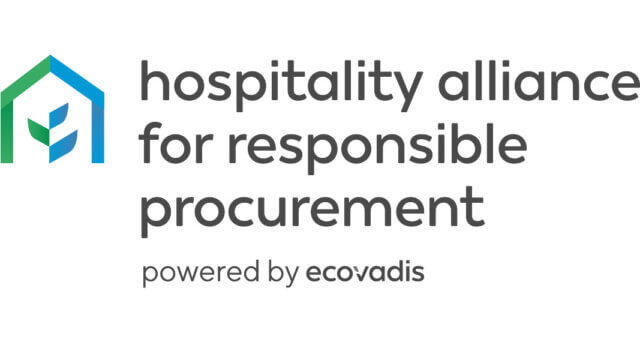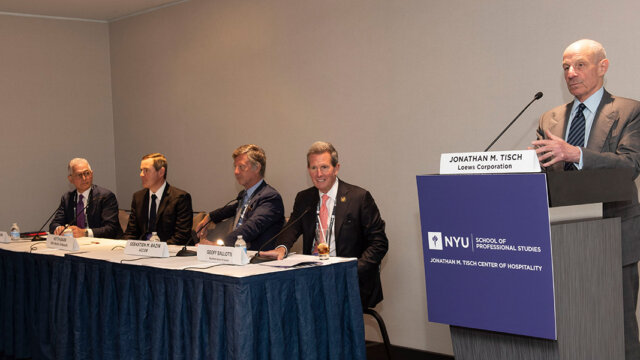NEW YORK—As the hospitality industry continues its march back from the COVID-19 pandemic, the 43rd Annual NYU International Hospitality Industry Investment Conference returned to an in-person event at the New York Marriott Marquis here.
“The CEOs Check In: A View From the Top” session, moderated by Sara Eisen, anchor, “Closing Bell,” CNBC, offered insights on a variety of topics from a panel of industry leaders including Keith Barr, CEO, IHG Hotels & Resorts; Sébastien M. Bazin, chairman/CEO, Accor; Anthony Capuano, CEO, Marriott International; David Kong, outgoing president/CEO, BWH Hotel Group; and Christopher J. Nassetta, president/CEO, Hilton.
Unsurprisingly, the labor shortage, which continues to be a big issue for the industry, was a topic of discussion.
Capuano said that it is important to let potential employees know that hospitality is still a great career option. “For decades, the employment space at large viewed travel and tourism as a safe harbor set of industries,” he said. “They could build plentiful jobs. They could build long careers. And when you look at the job losses that the industry has faced over the last two years, that confidence has been shaken. It’s incumbent on us and everybody in the room to tell the story of what a terrific set of industries it is, how easy it is to build a really productive career, but we’ve got some heavy lifting to do.”
Kong pointed out that a significant number of people have left the hospitality industry—and for many different reasons. “The whole COVID effect people made them rethink a lot of things,” he said. “Some people just got used to working at home and they don’t want to go back to the office. In the hotel business, you have to show up to work in a hotel, except for a few select positions. That’s going to be a problem for us going forward.”
When asked about what technology advances are important, Bazin said that too much time is wasted talking about technology. “We’re not a tech company,” he said. “We happen to be human capital, the hospitality industry. People come to the hotel to have a great time, to have fun, to meet somebody else to discover a culture, a natural environment and to come back richer. Of course, we make sure technology exists for before the stay, after the stay and a seamless process to enter the room. I accept this.“
While Nassetta agrees that hospitality is a people business, he sees technology as a way to make the experience better for everyone. “Delivering great experiences for our customers is always going to be about the people and how you deliver that to people,” he said. “Having said that, where I disagree is—and we’ve spent a lot of time and money as others have—technology is going to matter, and we tend to think of it inside our company as the ‘phygital’ part of our business, which is how do we connect the physical and digital in a way to take friction out of the experience and create a little bit more delight. [We are] using technology so that we can create efficiency that allows our people to do a better job customizing the experience and do it the way where technology can allow us to effectively mass customize to, in our case, 200 million people a year.”
When it comes to reaching customers, Barr predicted a change in how companies will do that. “With the exception of live sports, you’re going to see more the death of traditional media,” he said. “For years and years, we’d spend hundreds of millions of dollars buying big above-the-line media campaigns and putting them on television, and those are going to be going away. We learned that during COVID, was everybody pulled back. Nobody was buying media. You know what? The demand still came often than not. It got more and more targeted and personalized to you. I think you’re going to see this continued trend.”



